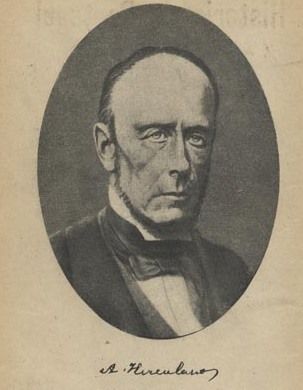Obras de referência da cultura portuguesa
"EURICO, O PRESBÍTERO"
de ALEXANDRE HERCULANO
Análise de Miguel Real
Tradução: Alexandra Leitão

Com a publicação de Eurico, o Presbítero, em 1844, Alexandre Herculano (1810-1877) inaugura o romance histórico em Portugal, ganhando a primazia a Almeida Garrett, cujo romance O Arco de Sant’Ana será editado dois anos mais tarde. Exilado em França, onde estuda a obra dos historiadores Thiers e Guizot, que o influenciará fortemente na escrupulosa metodologia de fidelidade ao documento e na escola do rigor analítico positivo, bem como em Inglaterra, onde, como leitor, convive com os romances de Walter Scott, Alexandre Herculano, regressado a Portugal, soube harmonizar com mestria, tanto em Eurico, o Presbítero quanto em O Bobo (1843, mas publicado em 1878), como, ainda, em O Monge de Cister (1848) e nos dois volumes d’As Lendas e Narrativas (“Alcaide de Santarém”, “Arras por Foro de Espanha”, “O Castelo de Faria”, “A Abóbada”, “A Dama Pé-de-Cabra”, “O Bispo Negro”, “A Morte do Lidador”, “O Pároco de Aldeia” e, narrando os seus tempos de emigrante político em 1831, “De Jersey a Granville”) o ditame minucioso do método histórico com a urdidura ficcional do romance.
Abordando a questão do celibato, Eurico, o Presbítero faz par temático com O Monge de Cister, tendo Alexandre Herculano dado às duas narrativas o título geral de “Monasticon”. Romance heróico, Eurico, o Presbítero analisa a contradição ética entre a irrupção sentimental da carne e a obediência à disciplina celibatária da Igreja. “Crónica-poema” lhe chamou o autor: “poema” devido ao seu estilo lírico-romântico; “crónica” porque narrativa da invasão da Península Ibérica pelos mouros em 711, separando os dois protagonistas do romance, Eurico e Hermengarda, filha de Favila e irmã de Pelágio. Repudiado pelo pai de Hermengarda devido a preconceitos de distinção social, Eurico, não logrando casar-se com a sua amada, abandona a vida social e professa ordens religiosas em Carteia. Hermengarda, por sua vez, entra no mosteiro da Virgem Dolorosa. De noite, um misterioso Cavaleiro Negro fere as hostes dos invasores árabes, vencendo-as. Por todo o lado, se fala nos prodígios de combate do Cavaleiro Negro. Hermengarda é raptada do mosteiro pelos invasores e é levada à presença do Amir, para que se torne sua amante. Eurico, o presbítero de Carteia, é o Cavaleiro Negro, salva Hermengarda no derradeiro instante e foge com Hermengarda desmaiada. Quando, finalmente, Eurico e Hermengarda se encontram sós e em segurança, ambos constatam a impossibilidade trágica da sua união – Eurico é sacerdote. Hermengarda enlouquece e Eurico, buscando a morte, desaparece pelejando entre as tropas mouras, trajando como Cavaleiro Negro.
O desenho da personagem de Eurico obedece à personalidade austera, independente, solitária e profundamente religiosa (sem obediência a um credo cristalizado) de Alexandre Herculano, historiador e cidadão divorciado das intrigas políticas do constitucionalismo liberal. Eurico evidencia-se, assim, como o retrato ético e cívico do seu autor, batalhando individualmente pelo progresso da pátria, exilado como Eurico, íntegro como Eurico, generoso, oferecendo a vida no cerco liberal do Porto como Eurico, disfarçado de Cavaleiro Negro, a oferecia nas pelejas contra o invasor; devotado ao silêncio da decifração de documentos medievais, como Eurico na solidão dos claustros. Eurico combate pela liberdade de Espanha, sofrendo injustos desentendimentos com a família de Hermengarda; Alexandre Herculano luta pela liberdade de Portugal contra o absolutismo régio. Dificilmente se encontrará outro romance em Portugal onde a essência da vida do autor e a da vida da personagem principal, sendo diferentes e existindo em épocas históricas diferentes, se plasmem harmonicamente numa vigorosa unidade estética.
EURICO, O PRESBÍTERO by ALEXANDRE HERCULANO
With the publication in 1844 of Eurico, o Presbítero, Alexandre Herculano (1810-1877) initiated the historical novel in Portugal, gaining ground on Almeida Garrett, whose novel O Arco de Sant’Ana was only published two years later. Exiled in France, Alexandre Herculano studied the works of the historians Thiers and Guizot, who had a strong influence on him concerning the scrupulous methodology of faithfulness to the document and the school of positive analytical accuracy, and later went to England where he experienced the novels of Walter Scott. On his return to Portugal, he managed with mastery to harmonise the detailed rule of the historical method with the fictional plot of the novel, both in Eurico, o Presbítero and in O Bobo (1843, but only published in 1878), but also in O Monge de Císter (1848) and in the two volumes of As Lendas e Narrativas (“Alcaide de Santarém”, “Arras por Foro de Espanha”, “O Castelo de Faria”, “A Abóbada”, “A Dama Pé-de-Cabra”, “O Bispo Negro”, “A Morte do Lidador”, “O Pároco de Aldeia” and narrating his time as a political émigré in 1831, “De Jersey a Granville”).
Touching on the issue of celibacy, Eurico, o Presbítero pairs thematically with O Monge de Císter, Alexandre Herculano having given the two stories the general title of “Monasticon”. Eurico, o Presbítero is a heroic novel that analyses the ethical contradiction between the sentimental eruption of the flesh and obedience to the Church’s celibate discipline. The author called it a “chronicle-poem”: “poem” because of its lyrical and romantic style; “chronicle” because it narrates the Moorish invasion of the Iberian Peninsula in 711, which separates the two characters in the novel, Eurico and Hermengarda, daughter of Favila and sister of Pelágio. Repudiated by Hermengarda’s father because of social prejudices, on not being able to marry his loved one Eurico abandons his social life and takes religious orders in Carteia. In turn, Hermengarda enters the convent of the Virgem Dolorosa. At night, a mysterious Black Knight attacks the hordes of Moorish invaders and vanquishes them. Everywhere there is talk of the fighting skills of the Black Knight. Hermengarda is kidnapped from the convent by the invaders and taken to the presence of Amir, to become his mistress. Eurico, the priest from Carteia, is the Black Knight and in the nick of time saves Hermengarda and flees with her as she lies senseless. When they finally find themselves alone and in safety, both recognise the tragic impossibility of their union – Eurico is a priest. Hermengarda goes mad and seeking death Eurico, in the guise of the Black Knight, disappears during his fight against the Moorish hordes.
The portrait of Eurico’s character is in keeping with the austere, independent, solitary and deeply religious personality (with no obedience to a crystallised credo) of Alexandre Herculano, an historian and a citizen divorced from the political intrigues of liberal constitutionalism. Eurico is thus the ethical and civic portrait of his author, singly battling for the progress of his fatherland, exiled like Eurico, upright like Eurico, generous, offering his life in the liberal siege of Oporto as disguised as the Black Knight Eurico did offer his in his fights against the invader; devoted to the silence of deciphering medieval documents like Eurico in the solitude of the cloisters. Eurico fights for Spain’s freedom, suffering unjust misunderstandings on the part of Hermengarda’s family; Alexandre Herculano fights for Portugal’s freedom against royal absolutism. It would be difficult to find another novel in Portugal where the essence of the author’s life and the life of the main characters, whilst different and existing in different eras, are harmonically shaped in a vigorous aesthetic unity.
Obras de Referência da Cultura Portuguesa
projeto desenvolvido pelo Centro Nacional de Cultura
com o apoio do Ministério da Cultura

 Divulgue aqui os seus eventos
Divulgue aqui os seus eventos














